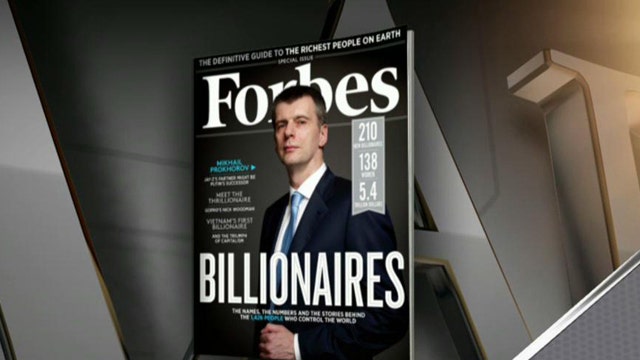5 Lessons for Entrepreneurs From Forbes’ Billionaires List
It’s safe to say the men and women on Forbes’ list of billionaires know how to run a company straight into profits.
But that doesn’t mean that the road to success has always been smooth; in many cases, it took some of the list’s entrepreneurs years of serious struggle to achieve success, says Steve Blank, a serial entrepreneur and professor of entrepreneurship at Stanford University.
What can you learn from the world’s wealthiest players and their paths to success? FOXBusiness.com asked Blank to break it down.
No 1. It’s Not Always About the Most Innovative Product
Blank says that Bill Gates, founder of Microsoft and No. 2 on Forbes’ list, rose to the top not necessarily on the strength of his innovative prowess.
“A successful tech company is not always about the product … sometimes it’s about controlling the distribution channel,” says Blank.
“If it was about innovation, no one would be using Windows! Instead, he’s brilliant because he created a Windows ecosystem based on coercion and incentives – that was his real innovation.”
No 2. Learn How to Choose No. 2s -- and Delegate
Blank admires Amazon’s Jeff Bezos, No. 19, for his ability to continue to innovate and reinvest in his company, holding investors at arm’s length. One of the reasons he’s able to do this, suggests Blank, is that he is able to continue to be a visionary and leave the actual running of the company to “world-class lieutenants.”
No 3. Be a Vampire
One of the most difficult times for founders, says Blank, is during the growth period, when they may not have the experience necessary to run a major company. At risk of getting thrown out by impatient boards, it’s necessary to grow up in a short period of time.
Blank points to Gates again: “Most people don’t know that Bill Gates went through 4 or 5 presidents of his company. He was great at bringing people in, using them and throwing them out!”
“He sucked the life energy out of them, not out of rancor, but in order to learn and grow up. He’s like a vampire … He gets smarter, and they find that they’re now the ex-president, and Gates has moved on,” says Blank.
No 4. Prepare for Continuous Innovation
Blank takes aim at Michael Dell, No. 37, for leaving his company to operating execs, rather than continuing to innovate.
“He’s an example of someone who retired too early,” says Blank. “In the tech business, founders can never retire, unless they sell all their stock and have no intention of returning. Unless you’re prepared for continuous innovation until you die, sell your stock and never come back.”
No. 5. Don’t Be Afraid to Make Your Own Product Obsolete
“Elon Musk is a genius in the class of Jobs,” praises Blank. “If you think about it, he’s doing two hardware companies [Tesla and SpaceX], and I don’t know of many hardware companies with billion-dollar valuations.”
Blank suggests that Musk, No. 527 on the Forbes list, has succeeded by recognizing opportunity in industries that weren’t innovating by imagining the future.
“He took two industries and did what they should have done themselves. Tesla is not smarter than the collective intelligence of Detroit. But he’s been able to innovate outside of an existing corporate structure.
“It’s a lesson to large companies: Innovation is going to happen, and if you’re not willing to make your own products obsolete, someone else will do it for you.”




















